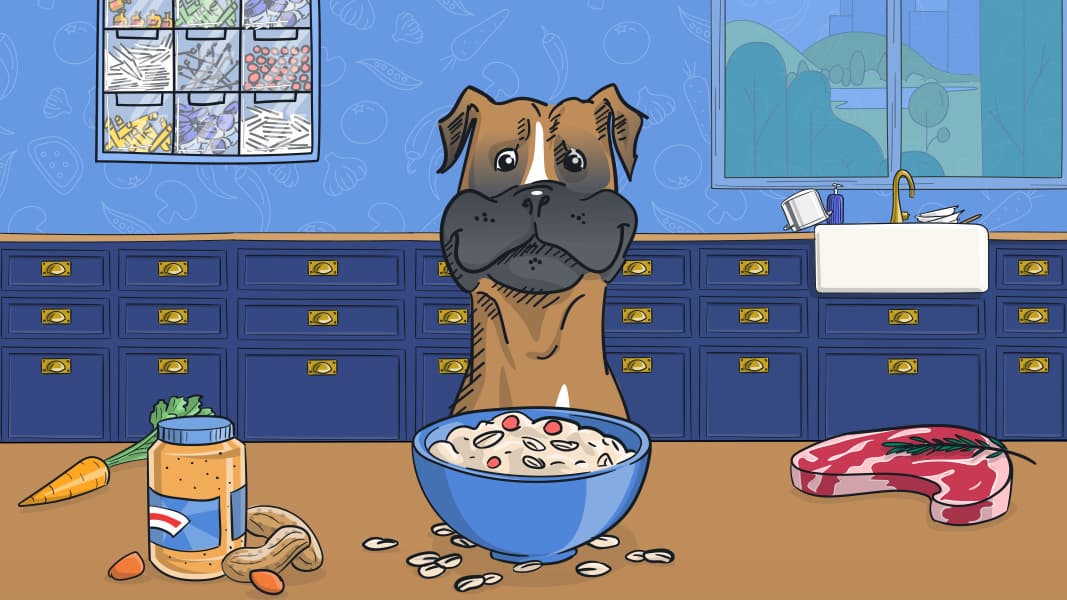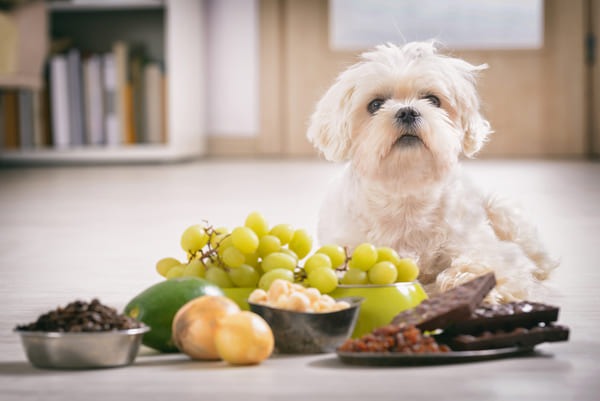
Before You Dish Out Dinner: What’s Safe and What’s a No-Go for Your Pup’s Plate?
While some may dub their furry friends ‘vacuum cleaners,’ gobbling up anything in sight, the reality is those seemingly harmless foods can spell danger for our canine companions. So, what’s truly on the menu, and what’s off-limits? Join Animalia as we serve up all the must-know recommendations and warnings.

Health & Science
02/29/2024
7 min read
Before we get into the details, let’s pump the brakes and dispel the myth that “dogs can eat anything.” Sure, your uncle’s furry friend might have indulged in daily chocolate treats and lived a long life, but that’s not the case for every pup. Animalia’s expert team is here to sift through the dos, don’ts, and “in moderation” treats.
Dangerous Delicacies: What Dogs Shouldn’t Eat
Boiled chicken bones – These pose a particular threat, especially for dogs prone to gobbling them down without a second thought to chewing. If these bones break, they can splinter into sharp fragments, potentially causing harm to the intestinal lining. In severe instances, this could lead to a dangerous scenario: a full perforation of the intestinal wall, allowing contaminated contents to leak into the abdominal cavity. This critical condition is known as “septic peritonitis,” posing a serious risk to your dog’s life.
Chocolate (and coffee) – While not all chocolate poses the same level of danger, certain varieties can have severe effects on dogs. Theobromine, a compound present in cocoa, is challenging for dogs to metabolize efficiently. If not properly broken down, it can remain in their system and lead to various ailments – from temporary digestive issues to critical conditions like irregular heart rhythms and seizures. Dark chocolate and cocoa powders contain high concentrations of this substance, making them particularly hazardous for our furry friends.
The severity of the impact varies based on the dog’s weight and amount ingested. Therefore, indulging in two cubes of milk or white chocolate may not pose a significant issue. However, high-quality chocolate or a rich chocolate cake, especially for smaller dogs, can indeed lead to life-threatening toxicities. Additionally, these products contain significant levels of caffeine, which can cause irregular heart rhythms and neurological signs. If you catch your dog pilfering chocolate or indulging in a chocolate cake, it’s crucial to reach out to your veterinarian promptly. They can assess whether the situation warrants inducing vomiting or if hospitalization for observation is necessary.
Xylitol – a sugar substitute commonly found in gums, toothpaste, and oral health products, is deemed safe and effective for humans. However, in dogs, it poses a severe risk, leading to dangerous drops in blood sugar levels (hypoglycemia) and liver toxicity. If a dog consumes products containing this sugar substitute, immediately contact your veterinarian, as the condition can be life-threatening.
Grapes (and raisins) – Long known to cause acute kidney failure in dogs, recent breakthroughs in research have shed light on the culprit: a substance called tartaric acid. Grapes and raisins contain varying concentrations of this acid. As a result, while some dogs may consume large quantities without adverse effects, even a small amount can lead to life-threatening kidney failure in other cases.
Alcohol (doughs) – While it’s uncommon for dogs to consume alcoholic beverages in dangerous amounts due to the unappealing taste, they may still encounter poisoning risks elsewhere. Raw yeast dough poses a significant threat. Fermentation of the dough within the digestive system produces ethanol in potentially lethal quantities. Moreover, the dough may expand, leading to intestinal blockages.
Marijuana – While cannabinoids have shown positive effects on dogs, particularly in pain relief and alleviating chronic inflammation, many dogs end up in emergency hospitals after ingesting large quantities of marijuana-infused cookies or other products. This overdose can lead to life-threatening conditions such as arrhythmias and convulsions.
Onions – Both onions and garlic, though to a lesser extent, pose a toxic threat to dogs, even in small quantities and particularly with regular consumption. These plants contain sulfides, compounds containing sulfur, which can lead to the destruction of red blood cells and subsequent anemia. While dogs consuming raw onions is relatively rare, the ingestion of homemade dishes containing a large amount of onions can result in poisoning.
What Can Dogs Eat in Small Portions, But With Caution
Milk and Dairy Products – While many dogs can safely enjoy yogurt, cottage cheese, and white cheese, sensitivity to lactose may cause digestive issues. However, products like yellow cheese with high-fat content should be given in very controlled amounts, especially for small dogs.
Peanut Butter – It can be a handy tool for stuffing chew toys or administering medication to dogs. However, it’s essential to use it in moderation due to its high fat content, which can potentially lead to pancreatitis.
Salami – While dogs may find it irresistible, its high saturated fat content isn’t the healthiest option for them. If available, opt for low-sodium chicken or turkey instead.
Bread – It can be a useful tool for giving medication and serves as a convenient treat, but use it sparingly. Excessive carbohydrates, even in dogs, can contribute to weight gain. And remember, absolutely no raisins in the bread, please.
Butter and Meat Fat – While some enjoy indulging their dogs with these treats, it’s crucial to understand the risks. Concentrated saturated fats can trigger inflammation of the pancreas (pancreatitis), a painful condition leading to digestive issues like vomiting, diarrhea, and loss of appetite, often requiring prolonged hospitalization. If you opt to spoil your pup, do so cautiously with very small amounts, especially for smaller dogs.

Safe Foods for Dogs
Vegetables, whether fresh or cooked – Certain veggies are safe for dogs to enjoy. This includes pumpkins, zucchini, sweet potatoes, beets, carrots, cucumbers, sweet peppers, and corn kernels (avoid corn on the cob). These veggies can make a great addition to your dog’s daily diet or serve as healthy snacks, as some dogs truly enjoy nibbling on them.
Some fruits are safe for dogs to enjoy – such as apples, bananas, strawberries, pineapples, blueberries, blackberries, and of course, watermelon. Just remember to remove the seeds from the watermelon before sharing it with your pup.
Tuna – a beneficial source of protein and healthy fats, making it a useful supplement for picky eaters or during illnesses when appetite needs a boost. Only feed small amounts.
Meat, chicken, and fish products – can be a boon for picky eaters or dogs requiring extra nutrition during illness. A serving of ‘washed’ chicken breast, in particular, often works wonders. It’s rich in high-quality protein and low in fat. Similarly, boneless salmon, cooked fish fillet, or lean beef can also be safe and satisfying options for your furry friend, without compromising their health. Be sure to never add seasonings.
Rice – can be beneficial in cases of acute diarrhea in dogs. Providing cooked rice with plenty of water (rice porridge) can help solidify stools and replenish lost fluids in the body.
Here are some additional recommendations for healthy snacks:
- Meat popsicles: A fun and refreshing treat for dogs, especially on hot days. Simply cook meat, chicken, or turkey in water until boiling, then simmer for another half hour on low heat. Let it cool slightly before pouring into bowls or popsicle molds. After a few hours in the freezer, your dog can enjoy a cold and satisfying snack in their favorite flavor.
- Fish oil: Dogs love the taste of fish oil, which contains essential fatty acids, including omega-3. Omega-3 is recommended for various health benefits such as arthritis, skin problems, and cognitive function in older dogs. You can find fish oil in dedicated products designed for pets. It can be dripped onto their food or the capsules can be broken and mixed into their meals.
What to Do if Your Dog Consumes Dangerous Foods?
If your dog has ingested a hazardous food from the list, contact the clinic or emergency center immediately. Provide them with three critical pieces of information: your dog’s weight, the type of food consumed (if possible, keep the label), and the estimated quantity. With this information, they can advise you on whether urgent medical attention is required or if monitoring at home is sufficient.
You can also check out our visual guide for more information.
No matter how vigilant you are, accidents can still occur. Your dog might snatch a slice of chocolate cake from the living room table while you’re briefly away in the kitchen. A simple oversight in your dog’s diet can lead to health issues and unexpected financial burdens. Having pet insurance provides peace of mind, knowing that it covers expenses every step of the way, allowing you to navigate any situation with confidence.



Get your pet insurance quote
Pet type
- Dog
- Cat
What is your pet's name?
Zip code




